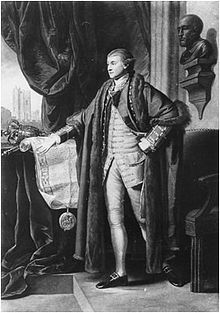Richard Grosvenor, 1st Earl Grosvenor
|
The Right Honourable The Earl Grosvenor |
|
|---|---|

Grosvenor, after Benjamin West
|
|
| Personal details | |
| Born |
18 June 1731 Eaton Hall, Cheshire, England |
| Died | 5 August 1802 (aged 71) |
| Resting place | St Mary's Church, Eccleston, Cheshire, England |
| Nationality | British |
| Political party | Tory |
Richard Grosvenor, 1st Earl Grosvenor (18 June 1731 – 5 August 1802), known as Sir Richard Grosvenor, Bt between 1755 and 1761 and as The Lord Grosvenor between 1761 and 1784, was a British peer, racehorse owner and art collector. He was created Baron Grosvenor in 1761 and in 1784 became both Viscount Belgrave and Earl Grosvenor.
Richard Grosvenor was born at Eaton Hall, Cheshire, the elder son of Sir Robert Grosvenor, 6th Baronet. He was educated at Oriel College, Oxford, graduating MA in 1751 and DCL in 1754.
He became Member of Parliament for Chester in 1754 and continued to represent the city until 1761, when he became Baron Grosvenor and was elevated to the House of Lords. He was mayor of Chester in 1759 and in 1769 he paid for the building of the Eastgate in the city. Grosvenor extended his estate by the purchase of the village of Belgrave, and the manor of Eccleston in 1769. He succeeded as 7th baronet on the death of his father in 1755.
Initially, Grosvenor was, like his father, a Tory, but later he came to support the ideas of William Pitt the elder. In 1758 he declared himself in favour of the Pitt-Newcastle coalition and following this he was created Baron Grosvenor in 1761. However, when the Tory Earl of Bute became Prime Minister the following year, Grosvenor changed his allegiance. Then, when Pitt was returned to power in the Chatham Ministry of 1766–68, Grosvenor returned to support him. During the 1770s he supported Lord North during the American War of Independence. He voted against Fox's India Bill in 1783 and was rewarded by William Pitt the Younger with title of Earl Grosvenor the following year.
...
Wikipedia
